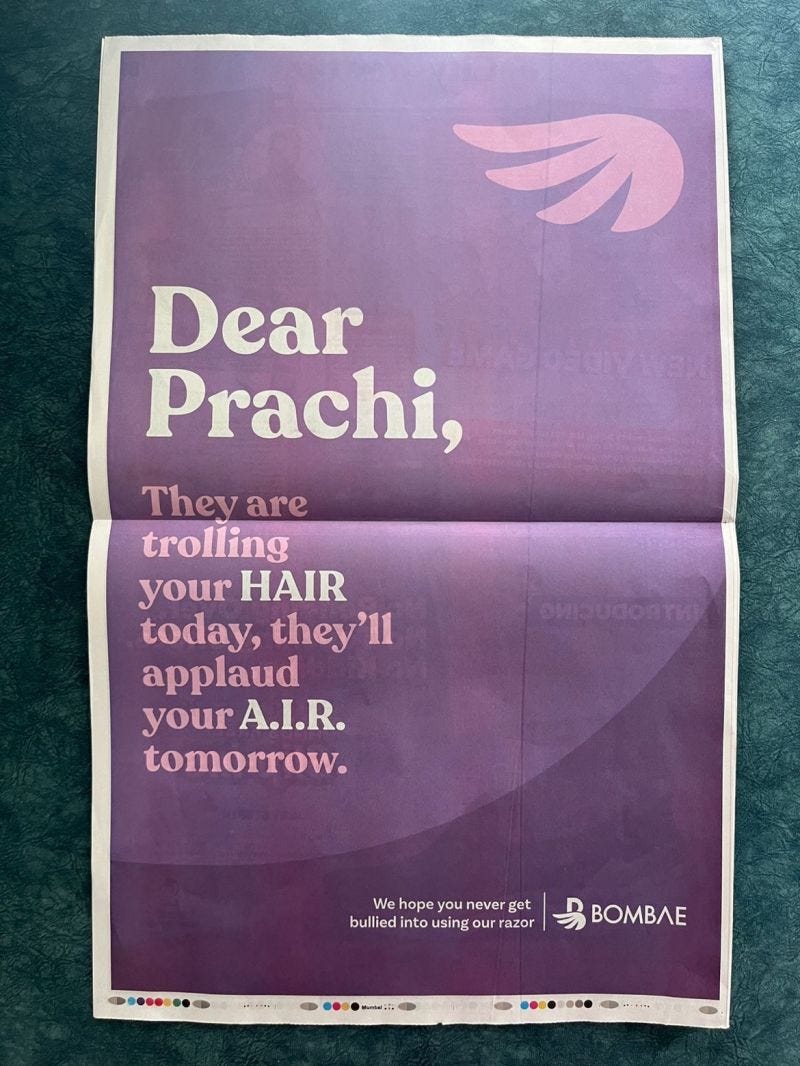JioCinema’s race to the bottom
₹1 a day does not make a sustainable streaming business. What do JioCinema’s rock-bottom plans bode for the future of streaming subscriptions?
Good afternoon!
Welcome to The Impression, your weekly primer on the business of media, entertainment, and content.
If someone shared this newsletter with you or if you’ve found the online version, hit the button below to subscribe now—it’s free! You can unsubscribe anytime.
Last year was JioCinema’s first time streaming the IPL. What better way to capitalise on the massive audience you’ve just acquired than to flood it with free entertainment? In 2023, JioCinema kept IPL viewers hooked by releasing a new film or web series episodes every Friday, starting with Shahid Kapoor’s film Bloody Daddy in June. It even ran the ad campaign, ‘Dekhta Ja India’ (Keep watching, India).
This year, JioCinema is asking its viewers who came for the IPL to pay for the rest, just a little bit. New subscription plans, announced last Thursday, price all of JioCinema’s premium and mass content at just about a rupee a day (for the first month, then ₹2 a day or ₹59/month). That’s a tenth of the price of Amazon Prime Video and Netflix, and still about 20% of the basic plans offered by its local counterparts Zee5 and SonyLIV.
It feels an awful lot like 2016.
Back then, Jio’s rock bottom prices for mobile data ushered a new internet age in India. But it is now impossible for the telecom industry to make good money from selling data alone.
Cut to today…
Will JioCinema kill OTT subscriptions?

As JioCinema rolled out its new prices last Thursday, Viacom18’s Kiran Mani was at a conference in Mumbai laying out plans for how JioCinema will earn from both advertisers and subscribers. Mani is Viacom18’s CEO for digital business.
“I don’t believe there is anything called free,” Mani told attendees at the conference, hosted by the Asia Video Industry Association (AVIA), an entertainment industry body. “There is a price to everything. From a consumer perspective, what we are grateful for is that they give us their time and permission to show them ads.”
Yet this year, JioCinema has placed an extremely low paywall of nearly ₹1 a day on all its original content apart from the IPL. This includes premium libraries of HBO, Peacock, and NBCUniversal, bringing its content offerings at par with (or exceeding) those of Netflix and Amazon Prime Video. Besides, JioCinema has nearly stopped commissioning originals for the platform; Mani alluded to this by emphasising that the platform was keen on “doing more with content.”
Critics of Jio’s ultra-low prices for cellular data labelled the company’s data plans as ‘predatory’. In 2016, when Jio first launched, data prices in India fell 48% while the time Indians spent online skyrocketed. Jio’s pricing forced its rivals Vodafone and Idea to merge; the combined telco Vi is just about surviving. Even until last year, the telecom regulator was fielding complaints of Jio’s ultra-low pricing for its other offerings, including broadband and cable TV channels.
Will India’s still-nascent OTT industry face a similar fate?
One answer comes from the way Reliance thinks about subscription video-on-demand or the SVOD business model in streaming.
“There are two kinds of subscription platforms in India,” Mani said last week. “One is: I [the platform] have paid an ‘x’ amount for content and hence I want you [the subscriber] to pay me a certain amount for it. And I am hoping this content is suitable [for all kinds of users].”
But what about those users who are unwilling to pay because all the content in a platform’s library doesn’t interest them? “Entertainment suits a certain kind of genre that says don’t interrupt me while I’m viewing it, and that’s where our pricing strategy for the consumer comes in. We don’t see this as free and paid, we see it as permissions granted by our customers.”
For now, JioCinema considers its ultra-low subscription prices as a substitute for ads rather than a sustainable income stream that can cover the cost of the content it shows. Instead, Mani says, the platform wants to be a “daily habit” for its users. The money may come in from the users paying ₹29-59 a month, or (more likely) it will come in from a larger, more diverse pool of advertisers, ideally like the scale of ad customers Meta and Google now have in India.
“You [the OTT platform] tend to obsess over the fact that I have these ten pieces of premium content and then you try to build a content-based platform,” he said. That locks a platform into getting a customer’s attention (and money) only when it has content they are willing to watch at that time. I need to get permission from the user that I become their daily habit[sic]… As we get more permissions, we will move from a streaming platform to a daily viewing platform to next year, a superior advertiser platform too.”
Content Landfill
JioCinema isn’t the first to offer subscriptions at super-low prices. Five years ago, Hotstar debuted a ‘VIP’ pack at ₹365/year. But this subscription came without Hotstar’s premium library from HBO, National Geographic, and others while JioCinema has thrown everything into the mix.
“When you receive something like this for so cheap, you fail to see its first true value and the real cost that went into making it,” a senior OTT executive told The Impression on condition of anonymity. “When it is put behind a paywall, you will just say you can’t pay for it anymore.”
Platforms in India are cutting their budgets for both originals and acquisitions, leaving unsold inventory (films and TV shows) to pile up with production houses. JioCinema’s lone upcoming original series, called Ranneeti: Balakot & Beyond, has been ready for release for over a year, two OTT industry executives told The Impression on condition of anonymity.
JioCinema’s call to think less about content and more about being a ‘daily habit’ will only make content creators’ money problems worse. Soon, Reliance will own two major TV broadcasters (Star and Viacom) and three major film studios (Viacom, Jio Studios, Fox Star) along with Hotstar’s libraries and Disney’s unlimited original programming. It does not need to commission more content to broaden its offerings, nor can it recover the cost of any quality new programming with its current subscription gameplan.
“We’ve run the gamut of paying too much and also too little,” the OTT executive quoted above told The Impression. “The people who make content are getting undercut in every way possible, told to prioritise quantity over quality. As an industry, we will have a moment of reckoning and it will come sooner rather than later. But unlike the waste from fast fashion, content is not lying in a landfill in Somalia destroying the environment. So, we don’t feel the impact of our decisions yet.”
Last Scroll Down📲
Scan the big media headlines from the week gone by
Mission Paramount: Bob Bakish, CEO of iconic Hollywood studio Paramount, quit amidst a possible merger with smaller rival Skydance Media. Paramount also hosted a strange, short earnings call announcing that three executives will handle the CEO’s office, ending it all by blasting the theme song of Mission Impossible, a Paramount title.
No publicity: Layoffs are hitting more kinds of media businesses; advertising giant Omnicom-owned PR firm Ketchum Sampark is laying off 40 people in India and China while remaining employees and Ketchum’s clients are being moved to sister firm FleishmanHillard.
No news: Four unknown people allegedly broke into a Mumbai journalist Neha Purav’s home last week and threatened her; she had reported that local koli (fisherfolk) women were insulted when Mumbai electoral candidate Piyush Goyal complained about the smell of fish in the local fish markets.
Win and lose: Financial Times is the latest publisher to licence its content to OpenAI. Both companies will also jointly develop new AI products. Meanwhile, following The New York Times, a number of regional US newspapers owned by investment firm Alden Global have sued OpenAI for copyright infringement.
(Don’t) skip ad: Amazon made $11.82 billion in ad revenue in the March 2024 quarter, up 24% year on year. Meanwhile, Meta reported a 27% increase in revenue for Q1, its fastest quarterly growth since 2021 and revenue for Google’s parent Alphabet rose 15%, fastest since 2022.
Trumpet 🎺
Dissecting this week’s viral ‘thing’

A brand must think several times before it runs ads featuring children. In this case, Bombay Shaving Company’s sub-brand Bombae didn’t explicitly feature Prachi Nigam, this year’s Class 10 topper of the Uttar Pradesh Board Examinations. But the copy of this full page advertisement (in the newspapers no less) has enough to imply that the brand is talking about Nigam and the unforgivable comments on her appearance that went viral when she was featured in the news for her achievement.
It’s not clear how piggybacking on Nigam’s appearance is a good way for a personal care company to sell razors to women. Most responses to founder CEO Shantanu Deshpande’s LinkedIn post are critical, pointing out that the ad only extended Nigam’s ordeal instead of offering her solidarity from sexist, appearance-obsessed fools. Besides, does the ad even do what it is supposed to—tell people what it sells, and why?
Maybe those involved at the Bombay Shaving Company could benefit from watching Nigam’s interview with the BBC. In one heartbreaking moment, she wonders if life would have been easier for her had she scored less on her exams and not been a Board topper in the public eye.
Or perhaps teams looking for their next ‘moment marketing’ plank should carefully study this ad by FIITJEE: the coaching centre ran newspaper advertisements featuring a young student who left for a rival chain, claiming she scored lesser than their students did on the IIT entrance exam because she left the centre to join an “evil” rival.
It’s unclear if FIITJEE or Bombay Shaving Company had permission from either child to use them in their advertising, much less in such a disparaging way. But then, a child from a small town like Sitapur, Uttar Pradesh, is perhaps an easy target. How likely are her parents to sue a big brand backed by big names for violating her privacy, all for some advertising?
That’s all this week. If you enjoyed reading The Impression, please share it with your friends, family, and colleagues. And please write to me anytime at soumya@thecore.in with thoughts, feedback, criticism or anything you’d like to see discussed in this space. I'd love to hear from you.
Thanks for reading, and see you again next Wednesday!




This is an awesome article! The sentiment where a management guy was grateful for the time and permissions of his customers was really great. Overall, loved the article. 💯